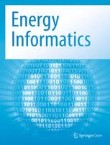Edited by Anke Weidlich, Dirk Neumann, Gunther Gust, Philipp Staudt and Mirko Schäfer.
Volume 4 Supplement 3
Proceedings of the 10th DACH+ Conference on Energy Informatics
Research
Publication of this supplement was funded by the German Federal Ministry for Economic Affairs and Energy. The articles have undergone a double blind peer review process. The Supplement Editors declare that they have no competing interests.
Virtual13-17 September 2021
-
Citation: Energy Informatics 2021 4(Suppl 3):11
-
Grey-box modelling of lithium-ion batteries using neural ordinary differential equations
Grey-box modelling combines physical and data-driven models to benefit from their respective advantages. Neural ordinary differential equations (NODEs) offer new possibilities for grey-box modelling, as differ...
Citation: Energy Informatics 2021 4(Suppl 3):15 -
A comprehensive study on battery electric modeling approaches based on machine learning
Battery electric modeling is a central aspect to improve the battery development process as well as to monitor battery system behavior. Besides conventional physical models, machine learning methods show great...
Citation: Energy Informatics 2021 4(Suppl 3):17 -
Comparison of short-term electrical load forecasting methods for different building types
The transformation of the energy system towards volatile renewable generation, increases the need to manage decentralized flexibilities more efficiently. For this, precise forecasting of uncontrollable electri...
Citation: Energy Informatics 2021 4(Suppl 3):13 -
Active participation of industrial enterprises in electricity markets - a generic modeling approach
Industrial enterprises represent a significant portion of electricity consumers with the potential of providing demand-side energy flexibility from their production processes and on-site energy assets. Methods...
Citation: Energy Informatics 2021 4(Suppl 3):20 -
Peak load minimization of an e-bus depot: impacts of user-set conditions in optimization algorithms
The transport sector is responsible for 25% of global CO2 emissions. To reduce emissions in the EU, a shift from the currently 745,000 operating public buses to electric buses (EBs) is expected in the coming year...
Citation: Energy Informatics 2021 4(Suppl 3):23 -
Quality of service and fairness for electric vehicle charging as a service
Due to the increasing battery capacity of electric vehicles, European standard electricity socket-outlets at households are not enough for a full charge cycle overnight. Hence, people tend to install (semi-) f...
Citation: Energy Informatics 2021 4(Suppl 3):16 -
Location and solar system parameter extraction from power measurement time series
Photovoltaic (PV) systems are considered an important pillar in the energy transition because they are usually located near the consumers. In order to provide accurate PV system models, e.g. for microgrid simu...
Citation: Energy Informatics 2021 4(Suppl 3):14 -
A practical approach to cluster validation in the energy sector
With increasing digitization, new opportunities emerge concerning the availability and use of data in the energy sector. A comprehensive literature review shows an abundance in available unsupervised clusterin...
Citation: Energy Informatics 2021 4(Suppl 3):18 -
Integrated planning of grids and energy conversion units in municipal multi-energy carrier systems
The ongoing energy transition requires the planning of low-emission municipal energy supply systems. These systems comprise distribution grids for electricity, gas, and heat, as well as energy conversion units...
Citation: Energy Informatics 2021 4(Suppl 3):19 -
Data and optimization model of an industrial heat transfer station to increase energy flexibility
Nations and companies are forced to reduce CO2 emissions and decelerate global warming. In this development, the transition of the heating sector is still in its infancy despite the relatively large share of ther...
Citation: Energy Informatics 2021 4(Suppl 3):24 -
Socio-technical modeling of smart energy systems: a co-simulation design for domestic energy demand
To tackle the climate crisis, the European energy strategy relies on consumers taking ownership of the energy transition, accelerating decarbonisation through investments in low-carbon technologies and ensurin...
Citation: Energy Informatics 2021 4(Suppl 3):12 -
Towards reinforcement learning for vulnerability analysis in power-economic systems
Future smart grids can and will be subject of systematic attacks that can result in monetary costs and reduced system stability. These attacks are not necessarily malicious, but can be economically motivated a...
Citation: Energy Informatics 2021 4(Suppl 3):21 -
Quantifying geospatial interdependencies of ICT and power system based on open data
In order to evaluate the effectiveness of innovative services and technologies spanning over the ICT-enabled power system, realistic models are required. Although nowadays there is a wide range of power system...
Citation: Energy Informatics 2021 4(Suppl 3):25 -
Asset logging in the energy sector: a scalable blockchain-based data platform
Due to a steeply growing number of energy assets, the increasingly decentralized and segmented energy sector fuels the potential for new digital use cases. In this paper, we focus our attention on the applicat...
Citation: Energy Informatics 2021 4(Suppl 3):22
- ISSN: 2520-8942 (electronic)
Annual Journal Metrics
-
Citation Impact 2023
Source Normalized Impact per Paper (SNIP): 0.761
SCImago Journal Rank (SJR): 0.568
Speed 2023
Submission to first editorial decision (median days): 10
Submission to acceptance (median days): 52
Usage 2023
Downloads: 394,833
Altmetric mentions: 17
